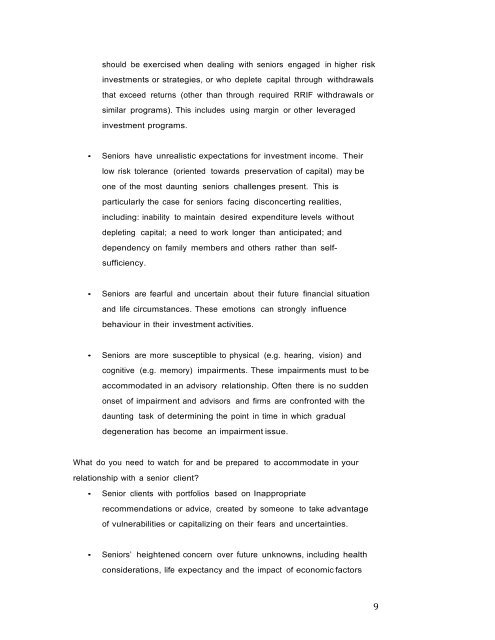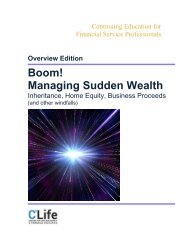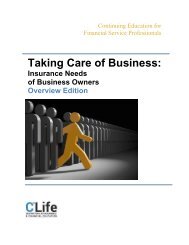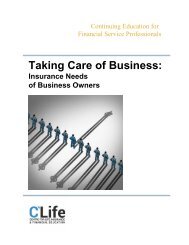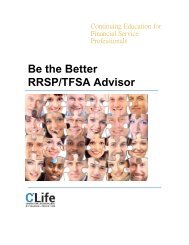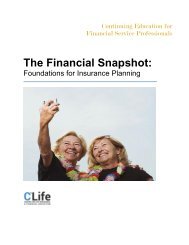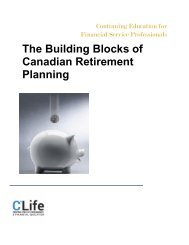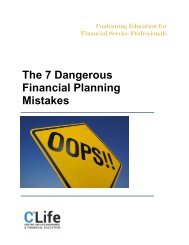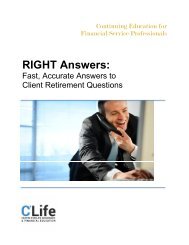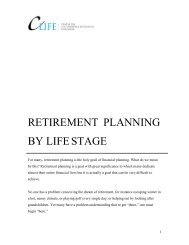Professional Responsibility and Seniors: Advisor Guidance for Ethical Practice
As a CFP professional, you need a professional responsibility CE credit annually. This course provides that credit. The focus is on ethics but you’ll read background on the challenges seniors present and thought-provoking case studies centred on seniors. Each case study draws upon FPSC® Principles and Rules to provide guidance for your responsibilities as a professional.
As a CFP professional, you need a professional responsibility CE credit annually. This course provides that credit. The focus is on ethics but you’ll read background on the challenges seniors present and thought-provoking case studies centred on seniors. Each case study draws upon FPSC® Principles and Rules to provide guidance for your responsibilities as a professional.
You also want an ePaper? Increase the reach of your titles
YUMPU automatically turns print PDFs into web optimized ePapers that Google loves.
should be exercised when dealing with seniors engaged in higher risk<br />
investments or strategies, or who deplete capital through withdrawals<br />
that exceed returns (other than through required RRIF withdrawals or<br />
similar programs). This includes using margin or other leveraged<br />
investment programs.<br />
• <strong>Seniors</strong> have unrealistic expectations <strong>for</strong> investment income. Their<br />
low risk tolerance (oriented towards preservation of capital) may be<br />
one of the most daunting seniors challenges present. This is<br />
particularly the case <strong>for</strong> seniors facing disconcerting realities,<br />
including: inability to maintain desired expenditure levels without<br />
depleting capital; a need to work longer than anticipated; <strong>and</strong><br />
dependency on family members <strong>and</strong> others rather than selfsufficiency.<br />
• <strong>Seniors</strong> are fearful <strong>and</strong> uncertain about their future financial situation<br />
<strong>and</strong> life circumstances. These emotions can strongly influence<br />
behaviour in their investment activities.<br />
• <strong>Seniors</strong> are more susceptible to physical (e.g. hearing, vision) <strong>and</strong><br />
cognitive (e.g. memory) impairments. These impairments must to be<br />
accommodated in an advisory relationship. Often there is no sudden<br />
onset of impairment <strong>and</strong> advisors <strong>and</strong> firms are confronted with the<br />
daunting task of determining the point in time in which gradual<br />
degeneration has become an impairment issue.<br />
What do you need to watch <strong>for</strong> <strong>and</strong> be prepared to accommodate in your<br />
relationship with a senior client?<br />
• Senior clients with portfolios based on Inappropriate<br />
recommendations or advice, created by someone to take advantage<br />
of vulnerabilities or capitalizing on their fears <strong>and</strong> uncertainties.<br />
• <strong>Seniors</strong>’ heightened concern over future unknowns, including health<br />
considerations, life expectancy <strong>and</strong> the impact of economic factors<br />
9


